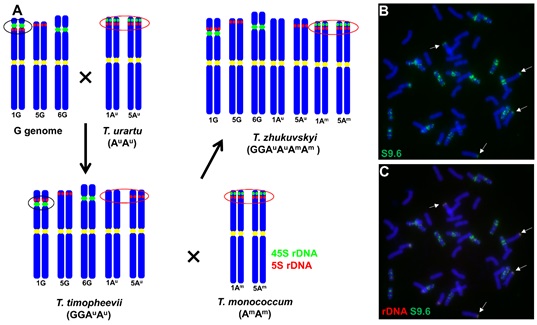Dr. HAN Fangpu's group from the Institute of Genetics and Developmental Biology of the Chinese Academy of Sciences reports the new insights on the evolution of nucleolar dominance in newly resynthesized hexaploid wheat
Triticum Zhukovskyi in an article published online in
The Plant Journal (
https://doi.org/10.1111/tpj.16320).
Nucleolar dominance (ND) is a widespread epigenetic phenomenon in distant hybridizations, which describes reversible nucleolus transcription failure at the uniparental nucleolus organizing region (NOR). However, the dynamics and transcription of NORs in speciation of Triticum zhukovskyi (GGAuAuAmAm) have not been reported.
In the current study, the researchers discover that T. zhukovskyi lost Au genome NORs during the first polyploidization, but retained Am genome NORs across the second polyploidization process. However, the rRNA genes from the Am genome were silenced in F1 hybrids (GAuAm) and remained inactive after chromosome doubling. Furthermore, in the case of GGAuAuDD polyploids, rRNA genes from T. timopheevii and Aegilops tauchii are both active in the F1 hybrids, and still be active in its amphiploids from low generation to the high offspring. The same mechanism, such as DNA methylation which previously acted on rDNA loci in Au genome, may also act on the newly arrived rDNA loci in Am genome, resulting in no transcriptional activity of Am in F1 hybrids (GAuAm).
These findings unveil a novel understanding of the ND associated with allopolyploidization over the evolutionary period of T. zhukovskyi, and highlight certain inactive repeats, such as rDNA units, may serve as the "first reserve" in the form of special chromatin structure to contribute to the successful evolution of polyploid.
Karyotype stability analysis of T. Zhukowski (GGAuAuAmAm) (Image by IGDB)
Contact:
Dr. HAN Fangpu
Institute of Genetics and Developmental Biology, Chinese Academy of Sciences
 Karyotype stability analysis of T. Zhukowski (GGAuAuAmAm) (Image by IGDB)Contact:Dr. HAN FangpuInstitute of Genetics and Developmental Biology, Chinese Academy of SciencesEmail: fphan@genetics.ac.cn
Karyotype stability analysis of T. Zhukowski (GGAuAuAmAm) (Image by IGDB)Contact:Dr. HAN FangpuInstitute of Genetics and Developmental Biology, Chinese Academy of SciencesEmail: fphan@genetics.ac.cn CAS
CAS
 中文
中文




.png)
